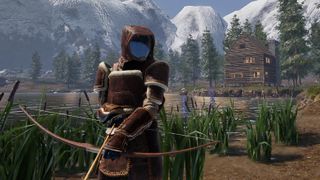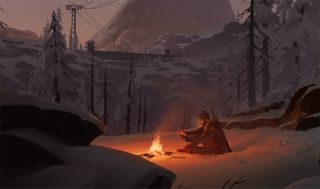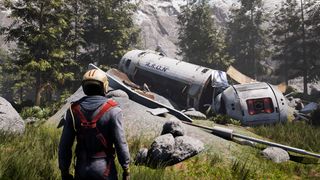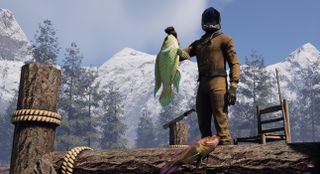Co-op survival games are great, but don't forget the intense joys of surviving solo
I love crafting, hunting, and exploring with friends, but there's really nothing like going it alone.

Co-op survival games continue to be huge. Lego Fortnite popped up this month and immediately attracted millions of players. Medieval Dynasty just added co-op play and its player base went from a few thousand to tens of thousands in the same day. In the past few years Sons of the Forest and Valheim became massive overnight hits, and every time I write about upcoming co-op survival RPG Enshrouded it gets a big response from readers.
The verdict: playing survival games with friends is, has been, and will continue to be awesome. But if I could just politely clear my throat and speak up from the back of the crowded room with a gentle reminder:
Playing survival games by yourself is… even awesomer.
Person vs nature
The worst moment in the entire history of cinema occurs at one hour, 19 minutes, and 18 seconds into the Tom Hanks film Cast Away. After watching the utterly engrossing struggle of an obnoxious FedEx manager trying to survive on a tiny island after a plane crash, these horrible words come up on the screen: "Four Years Later."
I felt cheated by this rude four year time jump. I'd been completely fascinated watching Tom Hanks hunt for food, make a shelter, craft tools, start a fire, and keep himself fed and hydrated all alone and in near complete silence. Long before I ever played a survival game, I found myself invested in watching a guy struggle to stay alive with no one to rely on but himself, a pair of ice skates, and a volleyball with a face painted on it.
Someone surviving alone in a hostile environment is one of my favorite movie genres: All is Lost with Robert Redford on a boat, The Martian with Matt Damon on Mars, Gravity with Sandra Bullock in orbit, Inside with Wilem Dafoe in a penthouse, Jeremiah Johnson with (again) Robert Redford—at least until the middle of the film when he becomes a frontier John Wick. Surviving against the odds all alone is intensely interesting to watch someone do in a film, and even more so to do yourself in a game.

There are lots of great singleplayer survival games like The Long Dark, Subnautica, and Don't Starve, and plenty of multiplayer survival games that are still great solo, like Astroneer, Project Zomboid, and Raft. I've recently been playing RocketWerks' survival game Icarus again (it's meant for co-op but supports solo play) and it's a great example of how much enjoyment there really is in solo survival. In open world mode I picked a nice spot in the wilderness near a waterfall, built a tiny shack, and began the long, slow, but satisfying process of climbing my way up the tech tree. Eventually my crummy campfire got replaced with a cooking pit and then a proper stove. Arrows made of wood and bone gave way to iron-tipped ones. Clothing made of plant fiber was eventually replaced with leather and fur.
The biggest gaming news, reviews and hardware deals
Keep up to date with the most important stories and the best deals, as picked by the PC Gamer team.
There's something special about making all those advances without anyone else's help. Working through all those steps by myself sure took a long time, but it also felt a lot more meaningful than swarming around the woods as part of a crowd to grind XP as quickly as possible. Cooking a recipe I learned on a stove I crafted with ingredients I hunted and grew myself tastes better (metaphorically, anyway) than if someone had done most of it for me.
Help isn't on the way

There's an extra level of intensity and satisfaction from doing it all on your own
Survival games are nothing without disasters, and when playing solo even a small accident can quickly turn into a full-on crisis. There was the time I stood too close to my campfire, caught on fire, and then ran through my cabin to get outside while my burning body set everything else on fire along the way. In fact I've spent a lot of time careening around in my base trying to stop it from being destroyed, like the night a heavy windstorm hit and I heard the dreadful sound of a tree falling directly onto the roof—followed by a massive shower of broken timbers. I dashed around with my repair hammer all night keeping the rest of the place from collapsing, and then spent the next day fixing everything.
I know those kinds of disasters can be a lot of fun with friends, too—try putting out a fire in your cabin in Icarus when three other people are also trying to put it out, also catch on fire, and spread it in three different directions. It's hilarious. But there's an extra level of intensity and satisfaction from doing it all on your own, springing from the tension of knowing that if you don't do it, there's no one else around who will.
Last week I took a long excursion to a cave to mine iron and platinum. While racing against the clock to return to my base before it got dark, I ran a little too quickly down a slope, found myself falling through the air, and broke my leg when I landed. I didn't have a splint, so my movement speed and my carry weight were both cut in half—an absolute disaster since my pockets were full of heavy ore and I was still a long way from home.

Things only got worse. I'd left most of my gear back at my base to make sure I could carry all that ore, so I had almost no resources to work with and was too slow and weighed down to harvest much before dark. A sudden shift in the weather brought heavy rain and winds, putting me at risk of exposure, so I had to start chopping down trees to make an emergency shelter. I'd forgotten to fill my canteen before my trip, so I took a slurp from a river and immediately contracted dysentery.
My ramshackle cabin in the woods was one of the most welcoming sights I've ever seen
It was a long and challenging night but I made it home the next morning, and my ramshackle cabin in the woods was one of the most welcoming sights I've ever seen. Not only did I learn a lesson—always bring my mount, a splint, a bedroll, and a full canteen with me—but I felt like I'd really survived something.
If I'd been playing with buddies that adventure would have been completely different. With all hands on deck, mining that cave of minerals would have taken only a couple of minutes instead of most of my day. If I'd broken my leg someone probably would have had a splint with them, or could have ridden out on a mount to quickly bring me one. A few of us working together could have knocked together an emergency shelter in a few seconds. Even if I died, someone could have grabbed all my gear and brought it back to base so I didn't have to do the panicked naked run to my tombstone to collect it.
That's the great thing about playing survival games with friends—you've always got someone watching your back. Usually, several people. But for pure intensity, challenge, and the satisfaction of true self-reliance, you just can't beat going it alone.

Chris started playing PC games in the 1980s, started writing about them in the early 2000s, and (finally) started getting paid to write about them in the late 2000s. Following a few years as a regular freelancer, PC Gamer hired him in 2014, probably so he'd stop emailing them asking for more work. Chris has a love-hate relationship with survival games and an unhealthy fascination with the inner lives of NPCs. He's also a fan of offbeat simulation games, mods, and ignoring storylines in RPGs so he can make up his own.
Most Popular

